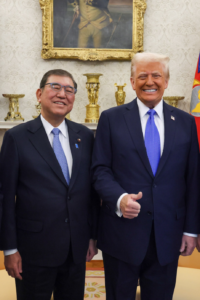 Mimaki Seiko, Associate Professor, Doshisha University On January 20, 2025, the inauguration ceremony of the 47th President, Donald Trump, kicked off the second term of the Trump administration. President Trump’s inaugural address was full of suggestions for what the future of the United States and the world will look like. At the beginning of his inaugural address, President Trump stated, “the golden age of America begins right now,” and emphasized, “we will not allow ourselves to be taken advantage of any longer.” The implication is this. Previous American presidents have been too good-natured, and have been led astray by other countries praising the United States with words such as “the leader of the international order.” These presidents have invested huge amounts of money and resources to protect the safety and prosperity of other countries, even at the expense of their own national interests. Such ... ... [Read more]
Mimaki Seiko, Associate Professor, Doshisha University On January 20, 2025, the inauguration ceremony of the 47th President, Donald Trump, kicked off the second term of the Trump administration. President Trump’s inaugural address was full of suggestions for what the future of the United States and the world will look like. At the beginning of his inaugural address, President Trump stated, “the golden age of America begins right now,” and emphasized, “we will not allow ourselves to be taken advantage of any longer.” The implication is this. Previous American presidents have been too good-natured, and have been led astray by other countries praising the United States with words such as “the leader of the international order.” These presidents have invested huge amounts of money and resources to protect the safety and prosperity of other countries, even at the expense of their own national interests. Such ... ... [Read more]
Archives
Back Number | Category Archives | Author Archives
Category Archives
America’s Retreat from the Role of “Leader of the Free World” and the Future of Japanese Diplomacy
Can the Global South Take Responsibility for the International Order? Redefining “Growth” and “Stability” in the Indo-Pacific
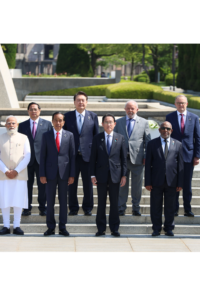 With the inauguration of the second Donald Trump administration, there are concerns about “vacuums,” especially those in security frameworks and economic order, which will increase the risks. How will the regional powers of the Indo-Pacific, that is, the Global South, try to change the international order with their own hands? And how can Japan cooperate with them? Ishii Masafumi (Special Adjunct Professor, Gakushuin University), Ito Toru (Professor, National Defense Academy), Oba Mie (Professor, Kanagawa University) —— The second Trump administration has shown great interest in China, Ukraine, the situation in Gaza, and other areas. But it hasn’t announced much about the Indo-Pacific. Ishii Masafumi: With the exception of India, the Trump administration has not paid much attention to the Indo-Pacific region The decline in America’s desire to engage abroad began with President Obama’s statement in 2013 that “America is not the world’s policeman,” a ... ... [Read more]
With the inauguration of the second Donald Trump administration, there are concerns about “vacuums,” especially those in security frameworks and economic order, which will increase the risks. How will the regional powers of the Indo-Pacific, that is, the Global South, try to change the international order with their own hands? And how can Japan cooperate with them? Ishii Masafumi (Special Adjunct Professor, Gakushuin University), Ito Toru (Professor, National Defense Academy), Oba Mie (Professor, Kanagawa University) —— The second Trump administration has shown great interest in China, Ukraine, the situation in Gaza, and other areas. But it hasn’t announced much about the Indo-Pacific. Ishii Masafumi: With the exception of India, the Trump administration has not paid much attention to the Indo-Pacific region The decline in America’s desire to engage abroad began with President Obama’s statement in 2013 that “America is not the world’s policeman,” a ... ... [Read more]
Asian NATO Is Not Viable: The Seriousness of a “Security Expert” Politician’s Lack of Basic Understanding
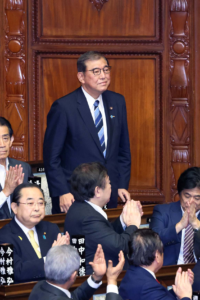 The impact of Ishiba’s “Hudson Paper” Ishiba Shigeru, who became the 102nd Prime Minister of Japan, is a self-recognized expert on defense issues, having served as Director-General of the Japan Defense Agency in the Koizumi Junichiro Cabinet and Minister of Defense in the Fukuda Yasuo Cabinet. He has described “national defense as my life’s work,” and is a heavyweight on the Liberal Democratic Party’s National Defense Division and the Security Research Commission, as well as a noted policy wonk in the political world as an expert on foreign affairs and security. He has not only participated in debates in the Diet, but has also actively published books and essays on defense issues, and is unique in having raised such issues in depth as a Diet member, particularly regarding Japan’s post-Cold War defense policy and the government’s interpretation of the defense-related Constitution. Since Ishiba retired ... ... [Read more]
The impact of Ishiba’s “Hudson Paper” Ishiba Shigeru, who became the 102nd Prime Minister of Japan, is a self-recognized expert on defense issues, having served as Director-General of the Japan Defense Agency in the Koizumi Junichiro Cabinet and Minister of Defense in the Fukuda Yasuo Cabinet. He has described “national defense as my life’s work,” and is a heavyweight on the Liberal Democratic Party’s National Defense Division and the Security Research Commission, as well as a noted policy wonk in the political world as an expert on foreign affairs and security. He has not only participated in debates in the Diet, but has also actively published books and essays on defense issues, and is unique in having raised such issues in depth as a Diet member, particularly regarding Japan’s post-Cold War defense policy and the government’s interpretation of the defense-related Constitution. Since Ishiba retired ... ... [Read more]
Will Raising the Standards for the “1.03-million-yen Barrier” Save Young People? — Social media politics and livelihood security
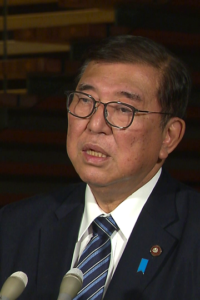 With the rise of the Democratic Party for the People (DPP), the “tax barrier” suddenly emerged. How did the DPP’s electoral strategy come about, and who supported it? And to what extent will the expansion of tax exemptions actually reduce the burden, and on whose behalf? Let’s consider a system that can bring real voices into politics. Two reasons for this focus The issue of the “1.03-million-yen barrier[1]” suddenly became the focus of political discussion, and the media reported on it extensively day after day. This is none other than a measure to significantly raise the current income tax exemption limit from 1.03 million yen to 1.78 million yen, and is the flagship policy of the DPP, which made a breakthrough by quadrupling its number of seats in the general election on October 27, 2024. If the new limit is really 1.78 million yen, ... ... [Read more]
With the rise of the Democratic Party for the People (DPP), the “tax barrier” suddenly emerged. How did the DPP’s electoral strategy come about, and who supported it? And to what extent will the expansion of tax exemptions actually reduce the burden, and on whose behalf? Let’s consider a system that can bring real voices into politics. Two reasons for this focus The issue of the “1.03-million-yen barrier[1]” suddenly became the focus of political discussion, and the media reported on it extensively day after day. This is none other than a measure to significantly raise the current income tax exemption limit from 1.03 million yen to 1.78 million yen, and is the flagship policy of the DPP, which made a breakthrough by quadrupling its number of seats in the general election on October 27, 2024. If the new limit is really 1.78 million yen, ... ... [Read more]
Will Centrist Politics Be Revived? The “Filtering” and “Absorbing” Functions of Political Parties Put to the Test
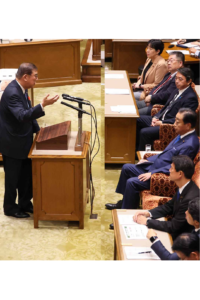 On the day the Lower House election was announced, I watched the movie Civil War (Japanese title: Shibiru Uo: America Saigo no Hi). It was written and directed by Alex Garland. The title Civil War refers to the civil war that divided America. The protagonist, an American camerawoman who has covered many battlefields, reflects that her past overseas reporting aimed to warn her homeland. However, now her home has become a battlefield. Her colleague comments that she has lost sight of journalism’s purpose.Indeed,despite having lost sight of their original purpose, the women continue their grueling reporting, but for what reason? Neither the women themselves nor the audience watching can fully understand, as the movie progresses. The movie depicts the civil war as if it has already started. Little attention is paid to the circumstances of why and how it came to be. It ... ... [Read more]
On the day the Lower House election was announced, I watched the movie Civil War (Japanese title: Shibiru Uo: America Saigo no Hi). It was written and directed by Alex Garland. The title Civil War refers to the civil war that divided America. The protagonist, an American camerawoman who has covered many battlefields, reflects that her past overseas reporting aimed to warn her homeland. However, now her home has become a battlefield. Her colleague comments that she has lost sight of journalism’s purpose.Indeed,despite having lost sight of their original purpose, the women continue their grueling reporting, but for what reason? Neither the women themselves nor the audience watching can fully understand, as the movie progresses. The movie depicts the civil war as if it has already started. Little attention is paid to the circumstances of why and how it came to be. It ... ... [Read more]
Japanese Politics at a Turning Point: From One-Party Dominance to the Era of Deliberative Debate
 2024 was an election year in which national elections were held around the world. Initially, some people thought there would be no election in Japan in 2024. However, in October, the Lower House was dissolved with one year left in its term, and a general election was held. Then, for the first time in 30 years, a minority ruling party was born, and Japanese politics is at a turning point. What does this mean? Let us delve deeper into this turning point. The last general election for the Lower House was held in October 2021, and the Liberal Democratic Party (LDP), led by President Kishida Fumio, won a landslide victory. It also won the regular election for the Upper House in July 2022. The term of the Lower House members will expire in October 2025, and the regular election for half of the ... ... [Read more]
2024 was an election year in which national elections were held around the world. Initially, some people thought there would be no election in Japan in 2024. However, in October, the Lower House was dissolved with one year left in its term, and a general election was held. Then, for the first time in 30 years, a minority ruling party was born, and Japanese politics is at a turning point. What does this mean? Let us delve deeper into this turning point. The last general election for the Lower House was held in October 2021, and the Liberal Democratic Party (LDP), led by President Kishida Fumio, won a landslide victory. It also won the regular election for the Upper House in July 2022. The term of the Lower House members will expire in October 2025, and the regular election for half of the ... ... [Read more]
China’s Semiconductor Industry Avoids “Blockade Against Miniaturization”
 The semiconductor friction between the United States and China is entering its eighth year. The US government sanctions since the first Trump administration have succeeded in blocking China’s development and production of advanced ICs. However, China is becoming more competitive. Three Phases of US sanctions against China The friction between the United States and China over semiconductors, a strategic material, entered its eighth year in the spring of 2025. The sanctions against China imposed by the first Trump administration were strengthened by the Biden administration and are now back in the hands of President Trump. The series of sanctions imposed by the US government can be summarized as a “blockade against miniaturization” of integrated circuits (ICs), but China’s semiconductor industry is gaining the competitiveness to evade them. Before looking ahead to semiconductor friction in the “another Trump” era, let’s look back at how ... ... [Read more]
The semiconductor friction between the United States and China is entering its eighth year. The US government sanctions since the first Trump administration have succeeded in blocking China’s development and production of advanced ICs. However, China is becoming more competitive. Three Phases of US sanctions against China The friction between the United States and China over semiconductors, a strategic material, entered its eighth year in the spring of 2025. The sanctions against China imposed by the first Trump administration were strengthened by the Biden administration and are now back in the hands of President Trump. The series of sanctions imposed by the US government can be summarized as a “blockade against miniaturization” of integrated circuits (ICs), but China’s semiconductor industry is gaining the competitiveness to evade them. Before looking ahead to semiconductor friction in the “another Trump” era, let’s look back at how ... ... [Read more]
Where Is Rapidus Heading? Questions Raised about “Semiconductor Support” through Examination of Taiwan’s TSMC
 Massive support for the semiconductor industry The semiconductor industry is the target of huge government subsidies in Japan. In 2021, the Ministry of Economy, Trade and Industry (METI) attracted Taiwan Semiconductor Manufacturing Company, Ltd. (TSMC), a Taiwanese semiconductor manufacturer and the world’s largest foundry (semiconductor contract manufacturing) company, to Kumamoto Prefecture. The first and second fabs of Japan Advanced Semiconductor Manufacturing, Inc. (JASM), which TSMC established as a joint venture with Sony Semiconductor Solutions and others, are scheduled to receive subsidies totaling up to 1.208 trillion yen under the framework of the Amended 5G Promotion Act, which came into effect in 2022. In 2022, Rapidus Corporation (hereinafter Rapidus), a foundry company, was established with strong support from METI and investment from eight private companies. The company introduces cutting-edge technology with a circuit line width of 2 nm (1 nm is one billionth of a ... ... [Read more]
Massive support for the semiconductor industry The semiconductor industry is the target of huge government subsidies in Japan. In 2021, the Ministry of Economy, Trade and Industry (METI) attracted Taiwan Semiconductor Manufacturing Company, Ltd. (TSMC), a Taiwanese semiconductor manufacturer and the world’s largest foundry (semiconductor contract manufacturing) company, to Kumamoto Prefecture. The first and second fabs of Japan Advanced Semiconductor Manufacturing, Inc. (JASM), which TSMC established as a joint venture with Sony Semiconductor Solutions and others, are scheduled to receive subsidies totaling up to 1.208 trillion yen under the framework of the Amended 5G Promotion Act, which came into effect in 2022. In 2022, Rapidus Corporation (hereinafter Rapidus), a foundry company, was established with strong support from METI and investment from eight private companies. The company introduces cutting-edge technology with a circuit line width of 2 nm (1 nm is one billionth of a ... ... [Read more]
The Way to Revitalize Japan’s Economy: The Government Should Not Intervene in Prices and Business Activities
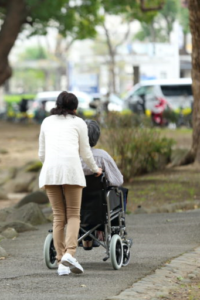 Key Points: Structural economic growth cannot be lifted by fiscal and monetary policies. Price controls through subsidies, etc. result in huge fiscal expenditure. Promote privatization of social security to harness the vitality of the private sector. The public is clamoring for this or that measure to revitalize the Japanese economy. However, many of these measures are unnecessary and may even create obstacles. Fiscal and monetary policies designed to stimulate the economy do not have the effects that the public generally believes they do. A review of economic research shows that these policies have had some success in providing support during business cycle downturns. However, their effects are strictly limited to business cycles as defined by economists. Such downturns do not occur as frequently as the public perceives. Real gross domestic product (GDP) typically zigzags and rises slowly over time. The average straight ... ... [Read more]
Key Points: Structural economic growth cannot be lifted by fiscal and monetary policies. Price controls through subsidies, etc. result in huge fiscal expenditure. Promote privatization of social security to harness the vitality of the private sector. The public is clamoring for this or that measure to revitalize the Japanese economy. However, many of these measures are unnecessary and may even create obstacles. Fiscal and monetary policies designed to stimulate the economy do not have the effects that the public generally believes they do. A review of economic research shows that these policies have had some success in providing support during business cycle downturns. However, their effects are strictly limited to business cycles as defined by economists. Such downturns do not occur as frequently as the public perceives. Real gross domestic product (GDP) typically zigzags and rises slowly over time. The average straight ... ... [Read more]
Weaving a Dictionary with AI
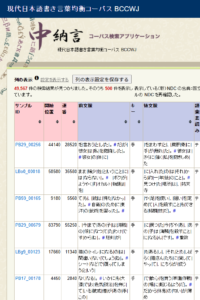 Japan’s largest and only large-scale dictionary of the Japanese language, the Second Edition of Nihon Kokugo Daijiten (Shogakukan Unabridged Dictionary of the Japanese Language; please refer to box), is undergoing its first major revision in 30 years. Shogakukan, the publisher of the dictionary, has announced that the Third Edition is scheduled to be published in 2032. They have considered the adoption of new digital technologies such as the Japanese corpora (please refer to photo caption) and AI for its editorial work. We spoke with Professor Emeritus Kondo Yasuhiro, an editorial board member and a leading corpus linguist, about how Nihon Kokugo Daijiten will shape the future of the dictionary and the Japanese language—and what role AI may play. [Nihon Kokugo Daijiten, Second Edition] 13 volumes + a supplementary volume Kitahara Yasuo, Kubota Jun, Taniwaki Masachika, Tokugawa Munemasa, Hayashi Oki, Maeda Tomiyoshi, Matsui Shigekazu, Watanabe ... ... [Read more]
Japan’s largest and only large-scale dictionary of the Japanese language, the Second Edition of Nihon Kokugo Daijiten (Shogakukan Unabridged Dictionary of the Japanese Language; please refer to box), is undergoing its first major revision in 30 years. Shogakukan, the publisher of the dictionary, has announced that the Third Edition is scheduled to be published in 2032. They have considered the adoption of new digital technologies such as the Japanese corpora (please refer to photo caption) and AI for its editorial work. We spoke with Professor Emeritus Kondo Yasuhiro, an editorial board member and a leading corpus linguist, about how Nihon Kokugo Daijiten will shape the future of the dictionary and the Japanese language—and what role AI may play. [Nihon Kokugo Daijiten, Second Edition] 13 volumes + a supplementary volume Kitahara Yasuo, Kubota Jun, Taniwaki Masachika, Tokugawa Munemasa, Hayashi Oki, Maeda Tomiyoshi, Matsui Shigekazu, Watanabe ... ... [Read more]
A Gaze upon Haniwa and Dogu
 The special exhibition Haniwa to Dogu no Kindai (Modern Images of Ancient Clay Figures) is currently on view at the National Museum of Modern Art, Tokyo (MOMAT) until December 22, 2024. What stories have people seen in ancient figures since the modern era? Tracing this “gaze” reveals changes in society and the mind in Japan. The monthly magazine Tokyojin held a roundtable discussion entitled “A Gaze upon Haniwa and Dogu” at MOMAT. The discussion was moderated by Matsui Mio and featured novelist Machida Ko, whose Koyaku Kojiki (colloquial translation of the Kojiki) has received much attention, and exhibition curators Hanai Hisaho and Nariai Hajime. Tradition, avant-garde and yuru-chara[1]. ……? A look at the haniwa / dogu boom ——In 2023, Mr. Machida published Koyaku Kojiki (Kodansha, 2023), a modern translation of the Kojiki.[2] A kofun[3] (an ancient burial mound) also appears in important scenes in ... ... [Read more]
The special exhibition Haniwa to Dogu no Kindai (Modern Images of Ancient Clay Figures) is currently on view at the National Museum of Modern Art, Tokyo (MOMAT) until December 22, 2024. What stories have people seen in ancient figures since the modern era? Tracing this “gaze” reveals changes in society and the mind in Japan. The monthly magazine Tokyojin held a roundtable discussion entitled “A Gaze upon Haniwa and Dogu” at MOMAT. The discussion was moderated by Matsui Mio and featured novelist Machida Ko, whose Koyaku Kojiki (colloquial translation of the Kojiki) has received much attention, and exhibition curators Hanai Hisaho and Nariai Hajime. Tradition, avant-garde and yuru-chara[1]. ……? A look at the haniwa / dogu boom ——In 2023, Mr. Machida published Koyaku Kojiki (Kodansha, 2023), a modern translation of the Kojiki.[2] A kofun[3] (an ancient burial mound) also appears in important scenes in ... ... [Read more]
Why Are There 180 Different Swimming Strokes? — Exploring Suifu-ryu Suijutsu, a School of Japanese Traditional Swimming
 [Physical Education/Sociology] There are swimming styles that have been passed down through the generations in Japan. Nihon eiho (Japanese swimming techniques) developed in a way suited to the waters of each region, such as rivers, lakes, and oceans. Currently there are 13 schools. We [the editorial staff of Mizu no Bunka] covered the historical background of one of them, Suifu-ryu suijutsu (Suifu school of the Japanese martial art of combat swimming), which is being kept alive in in Mito City, Ibaraki Prefecture, and were shown some of the swimming techniques. Can be continued for life, regardless of age Sideways in the water, with the face turned upwards above the surface, the swimmer performs scissor kicks called aoriashi while the lower hand extends forward and pulls down through the water. This is hitoe-noshi (single sideways kick), one of the representative swimming strokes of Suifu- ryu ... ... [Read more]
[Physical Education/Sociology] There are swimming styles that have been passed down through the generations in Japan. Nihon eiho (Japanese swimming techniques) developed in a way suited to the waters of each region, such as rivers, lakes, and oceans. Currently there are 13 schools. We [the editorial staff of Mizu no Bunka] covered the historical background of one of them, Suifu-ryu suijutsu (Suifu school of the Japanese martial art of combat swimming), which is being kept alive in in Mito City, Ibaraki Prefecture, and were shown some of the swimming techniques. Can be continued for life, regardless of age Sideways in the water, with the face turned upwards above the surface, the swimmer performs scissor kicks called aoriashi while the lower hand extends forward and pulls down through the water. This is hitoe-noshi (single sideways kick), one of the representative swimming strokes of Suifu- ryu ... ... [Read more]
Space Food and Disaster Food: Thinking about Food in Extreme Environments
 Dr. Tsuboyama-Kasaoka Nobuyo, Head of Section of Global Disaster Nutrition at the National Institute of Health and Nutrition in Japan talks about space food and disaster food — Interviewed by the vesta editorial team. Challenges in space and disaster nutrition research I have always been interested in space and have tried to become an astronaut three times in the last 25 years. Because my parents were mountain climbers, I have been going to high altitudes since I was a child, while scuba diving has challenged me in the depths of the ocean, so I wanted to try the most extreme space. As you can see from the fact that you can get altitude sickness when you climb a mountain or submarine sickness when you dive in the ocean, you can really feel the changes in your body when you go to a special environment. ... ... [Read more]
Dr. Tsuboyama-Kasaoka Nobuyo, Head of Section of Global Disaster Nutrition at the National Institute of Health and Nutrition in Japan talks about space food and disaster food — Interviewed by the vesta editorial team. Challenges in space and disaster nutrition research I have always been interested in space and have tried to become an astronaut three times in the last 25 years. Because my parents were mountain climbers, I have been going to high altitudes since I was a child, while scuba diving has challenged me in the depths of the ocean, so I wanted to try the most extreme space. As you can see from the fact that you can get altitude sickness when you climb a mountain or submarine sickness when you dive in the ocean, you can really feel the changes in your body when you go to a special environment. ... ... [Read more]
Optics Expert Takes on Tenmoku Tea Bowl
 A number of tenmoku tea bowls[1] were brought to Japan from China during the Kamakura period (1185–1333) and have been carefully passed down ever since. Among them, the most highly valued are the small number of “Yuteki Tenmoku[2]” and “Yohen Tenmoku[3]” tea bowls, designated as national treasures, which have unique oil spots and luster. This luster has been a great mystery not only to the potters who have tried to reproduce it, but also to researchers. In contrast to the previous theory that the luster is actually thin-film interference on the surface of the tea bowl, RIKEN researcher Ebizuka Noboru has proposed a new theory that the luster of the national treasure Yuteki Tenmoku tea bowl can be reasonably explained by the overlapping of light (multiple interference) caused by two-dimensional sine curve wrinkles. Discovering the National Treasure Yuteki Tenmoku tea bowl Whenever a ... ... [Read more]
A number of tenmoku tea bowls[1] were brought to Japan from China during the Kamakura period (1185–1333) and have been carefully passed down ever since. Among them, the most highly valued are the small number of “Yuteki Tenmoku[2]” and “Yohen Tenmoku[3]” tea bowls, designated as national treasures, which have unique oil spots and luster. This luster has been a great mystery not only to the potters who have tried to reproduce it, but also to researchers. In contrast to the previous theory that the luster is actually thin-film interference on the surface of the tea bowl, RIKEN researcher Ebizuka Noboru has proposed a new theory that the luster of the national treasure Yuteki Tenmoku tea bowl can be reasonably explained by the overlapping of light (multiple interference) caused by two-dimensional sine curve wrinkles. Discovering the National Treasure Yuteki Tenmoku tea bowl Whenever a ... ... [Read more]
A Nobel Prize Born of Healthy Argument
 Manabe Syukuro, recipient of the Nobel Prize in Physics, interviewed at his home: Learn from your rivals and play to your strengths – the world-renowned 90-year-old authority shares the secrets to reaching the pinnacle of achievement Interviewed by Tsuyama Keiko, journalist When I look back on it, my life as a researcher has been a string of good luck. A paper I wrote back in graduate school happened to catch the attention of an American researcher and I was invited to the US. Then, at a research institute in the US, I was blessed with good supervisors and staff in a positive environment, and I was able to immerse myself in research with full access to a supercomputer. That string of good luck continued all the way to receiving the Nobel Prize, but it truly came as a surprise. When you look at ... ... [Read more]
Manabe Syukuro, recipient of the Nobel Prize in Physics, interviewed at his home: Learn from your rivals and play to your strengths – the world-renowned 90-year-old authority shares the secrets to reaching the pinnacle of achievement Interviewed by Tsuyama Keiko, journalist When I look back on it, my life as a researcher has been a string of good luck. A paper I wrote back in graduate school happened to catch the attention of an American researcher and I was invited to the US. Then, at a research institute in the US, I was blessed with good supervisors and staff in a positive environment, and I was able to immerse myself in research with full access to a supercomputer. That string of good luck continued all the way to receiving the Nobel Prize, but it truly came as a surprise. When you look at ... ... [Read more]
Thoughts in Oslo: Inheriting the Essence of “No More Hibakusha”
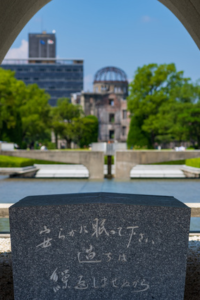 *Translated from “Osuro de Kangaetakoto: No Moa Hibakusha wo Uketsugu tameni (Thoughts in Oslo: Inheriting the Legacy of No More Hibakusha),” Sekai, February 2025, pp. 26–33. (Courtesy of Iwanami Shoten, Publishers) Hatakeyama Sumiko, Executive Committee Member of Peace Boat Japan Confederation of A- and H-Bomb Sufferers Organizations (Nihon Hidankyo) was awarded the 2024 Nobel Peace Prize. Recently (December 10, 2024, Japan time), the Nobel Peace Prize award ceremony was held in Oslo, Norway. To attend the ceremony, more than 30 people, including Hiroshima and Nagasaki atomic bomb survivors (hibakusha) who are executives of Nihon Hidankyo and related parties, traveled to Oslo as an official delegation. In conjunction with this, Peace Boat, in cooperation with Gensuikyo (Japan Council Against A & H Bombs), planned the “Nihon Hidankyo Nobel Peace Prize Celebration Tour” so that many hibakusha, second and third generation atomic bomb survivors, related organizations, and individuals ... ... [Read more]
*Translated from “Osuro de Kangaetakoto: No Moa Hibakusha wo Uketsugu tameni (Thoughts in Oslo: Inheriting the Legacy of No More Hibakusha),” Sekai, February 2025, pp. 26–33. (Courtesy of Iwanami Shoten, Publishers) Hatakeyama Sumiko, Executive Committee Member of Peace Boat Japan Confederation of A- and H-Bomb Sufferers Organizations (Nihon Hidankyo) was awarded the 2024 Nobel Peace Prize. Recently (December 10, 2024, Japan time), the Nobel Peace Prize award ceremony was held in Oslo, Norway. To attend the ceremony, more than 30 people, including Hiroshima and Nagasaki atomic bomb survivors (hibakusha) who are executives of Nihon Hidankyo and related parties, traveled to Oslo as an official delegation. In conjunction with this, Peace Boat, in cooperation with Gensuikyo (Japan Council Against A & H Bombs), planned the “Nihon Hidankyo Nobel Peace Prize Celebration Tour” so that many hibakusha, second and third generation atomic bomb survivors, related organizations, and individuals ... ... [Read more]
Harassment of Male Assembly Members
 Hamada Mari, Representative of Stand by Women It is only recently that “harassment in the political field” has become an issue in Japan. One of the triggers was the “Revised Act on Promotion of Gender Equality in the Political Field” enacted in 2021, which mandated the central government, local governments, political parties, etc. to take measures against sexual harassment and maternity harassment (political parties are obliged to make efforts). As a result, the media reported on the issue, local assemblies made efforts to address the issue, and the reality of harassment, which had been made invisible as a cost of participating in politics, began to come to light. According to the Gender Equality Bureau, Cabinet Office (CAO) “Research report on barriers to women’s political participation” (2021), 65.5% of women and 58.0% of men experienced harassment from voters, supporters, assembly members, etc. while considering or ... ... [Read more]
Hamada Mari, Representative of Stand by Women It is only recently that “harassment in the political field” has become an issue in Japan. One of the triggers was the “Revised Act on Promotion of Gender Equality in the Political Field” enacted in 2021, which mandated the central government, local governments, political parties, etc. to take measures against sexual harassment and maternity harassment (political parties are obliged to make efforts). As a result, the media reported on the issue, local assemblies made efforts to address the issue, and the reality of harassment, which had been made invisible as a cost of participating in politics, began to come to light. According to the Gender Equality Bureau, Cabinet Office (CAO) “Research report on barriers to women’s political participation” (2021), 65.5% of women and 58.0% of men experienced harassment from voters, supporters, assembly members, etc. while considering or ... ... [Read more]
Thirty Years after the 1995 Great Hanshin-Awaji Earthquake: Sustainable Urban Development Based on Lessons Learned from the Disaster
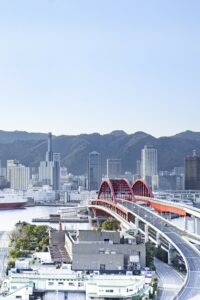 Hisamoto Kizo, Mayor of Kobe It has been thirty years since the Great Hanshin-Awaji Earthquake occurred on January 17, 1995. At the time, the Kobe City Government quickly steered the city toward revitalization, and I think we have been able to recover and rebuild at a fairly fast pace. On March 17, just two months after the disaster, the city implemented the Urban Area Redevelopment Project. There was a lot of criticism because a large-scale urban redevelopment plan was proposed while many disaster victims were still living in evacuation centers. However, Kobe’s decision paid off, and three types of housing — disaster recovery and rental accommodation, as well as units in redeveloped urban areas — were quickly provided. As a result, the need for temporary housing was eliminated in less than five years. Of course, not everything went quickly. Citizens were divided in their ... ... [Read more]
Hisamoto Kizo, Mayor of Kobe It has been thirty years since the Great Hanshin-Awaji Earthquake occurred on January 17, 1995. At the time, the Kobe City Government quickly steered the city toward revitalization, and I think we have been able to recover and rebuild at a fairly fast pace. On March 17, just two months after the disaster, the city implemented the Urban Area Redevelopment Project. There was a lot of criticism because a large-scale urban redevelopment plan was proposed while many disaster victims were still living in evacuation centers. However, Kobe’s decision paid off, and three types of housing — disaster recovery and rental accommodation, as well as units in redeveloped urban areas — were quickly provided. As a result, the need for temporary housing was eliminated in less than five years. Of course, not everything went quickly. Citizens were divided in their ... ... [Read more]
America’s Retreat from the Role of “Leader of the Free World” and the Future of Japanese Diplomacy
 Mimaki Seiko, Associate Professor, Doshisha University On January 20, 2025, the inauguration ceremony of the 47th President, Donald Trump, kicked off the second term of the Trump administration. President Trump’s inaugural address was full of suggestions for what the future of the United States and the world will look like. At the beginning of his inaugural address, President Trump stated, “the golden age of America begins right now,” and emphasized, “we will not allow ourselves to be taken advantage of any longer.” The implication is this. Previous American presidents have been too good-natured, and have been led astray by other countries praising the United States with words such as “the leader of the international order.” These presidents have invested huge amounts of money and resources to protect the safety and prosperity of other countries, even at the expense of their own national interests. Such ... ... [Read more]
Mimaki Seiko, Associate Professor, Doshisha University On January 20, 2025, the inauguration ceremony of the 47th President, Donald Trump, kicked off the second term of the Trump administration. President Trump’s inaugural address was full of suggestions for what the future of the United States and the world will look like. At the beginning of his inaugural address, President Trump stated, “the golden age of America begins right now,” and emphasized, “we will not allow ourselves to be taken advantage of any longer.” The implication is this. Previous American presidents have been too good-natured, and have been led astray by other countries praising the United States with words such as “the leader of the international order.” These presidents have invested huge amounts of money and resources to protect the safety and prosperity of other countries, even at the expense of their own national interests. Such ... ... [Read more]
Japanese Politics at a Turning Point: From One-Party Dominance to the Era of Deliberative Debate
 2024 was an election year in which national elections were held around the world. Initially, some people thought there would be no election in Japan in 2024. However, in October, the Lower House was dissolved with one year left in its term, and a general election was held. Then, for the first time in 30 years, a minority ruling party was born, and Japanese politics is at a turning point. What does this mean? Let us delve deeper into this turning point. The last general election for the Lower House was held in October 2021, and the Liberal Democratic Party (LDP), led by President Kishida Fumio, won a landslide victory. It also won the regular election for the Upper House in July 2022. The term of the Lower House members will expire in October 2025, and the regular election for half of the ... ... [Read more]
2024 was an election year in which national elections were held around the world. Initially, some people thought there would be no election in Japan in 2024. However, in October, the Lower House was dissolved with one year left in its term, and a general election was held. Then, for the first time in 30 years, a minority ruling party was born, and Japanese politics is at a turning point. What does this mean? Let us delve deeper into this turning point. The last general election for the Lower House was held in October 2021, and the Liberal Democratic Party (LDP), led by President Kishida Fumio, won a landslide victory. It also won the regular election for the Upper House in July 2022. The term of the Lower House members will expire in October 2025, and the regular election for half of the ... ... [Read more]
Global Trade Reconfiguration in the Election Super Year
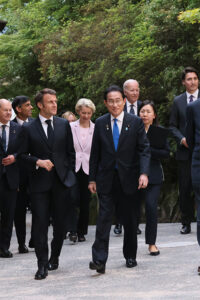 Ito Sayuri, Executive Director, Economic Research Department, NLI Research Institute Since the end of the Cold War, supply chains have expanded globally, and there are concerns about fragmentation due to multiple factors, including the escalating conflict between the United States and China, the COVID-19 pandemic, Russia’s invasion of Ukraine, and the climate crisis. At the G7 Hiroshima Summit in 2023, de-coupling was rejected as an approach to economic resilience and economic security, and a policy based on de-risking was affirmed. Friendshoring, the formation of supply chains among allied or like-minded countries; nearshoring, the relocation of business to neighboring countries; and reshoring and onshoring, the return of business to a country, became buzzwords to indicate the direction of restructuring supply chains. Changes are already visible in global trade data. In 2023, the amount of trade between the United States, the European Union and ... ... [Read more]
Ito Sayuri, Executive Director, Economic Research Department, NLI Research Institute Since the end of the Cold War, supply chains have expanded globally, and there are concerns about fragmentation due to multiple factors, including the escalating conflict between the United States and China, the COVID-19 pandemic, Russia’s invasion of Ukraine, and the climate crisis. At the G7 Hiroshima Summit in 2023, de-coupling was rejected as an approach to economic resilience and economic security, and a policy based on de-risking was affirmed. Friendshoring, the formation of supply chains among allied or like-minded countries; nearshoring, the relocation of business to neighboring countries; and reshoring and onshoring, the return of business to a country, became buzzwords to indicate the direction of restructuring supply chains. Changes are already visible in global trade data. In 2023, the amount of trade between the United States, the European Union and ... ... [Read more]